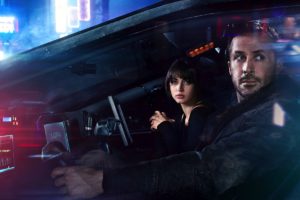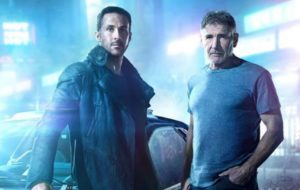 Like the next generation of replicants, “Blade Runner 2049” has some new gadgets, but it doesn’t measure up to the previous model. It’s dialed up the dystopia and alienation to epic levels, but the heart that pounded in the original “Blade Runner” is hard to find.
Like the next generation of replicants, “Blade Runner 2049” has some new gadgets, but it doesn’t measure up to the previous model. It’s dialed up the dystopia and alienation to epic levels, but the heart that pounded in the original “Blade Runner” is hard to find.
Brace yourself for the third movie in the trilogy.
I wanted to like “2049” after early reviews extolled the movie’s faithful expansion on the themes explored in Ridley Scott’s 1982 sci-fi masterpiece. What does it mean to be human? How much free will do we have and what should we do with it?
The film is faithful all right, with clips from the original, vast, echoing rooms with cold light and colder characters, and the very same Vangelis theme song playing at the end. Deckard, the hero of “Blade Runner,” even returns for one more mission.
What is “2049” about? I wasn’t sure for much of it. That’s also faithful to the original, which was so obscure in its first incarnation that Scott had to edit it and edit it again before the storyline really came together. At least the plot of “2049” started to make sense the morning after I watched it.
A replicant blade runner named “K,” played by Ryan Gosling with all the world weariness you could find on a dying world, happens upon a secret that could end the replicants’ slave status. His employer, the LAPD, wants it hushed up. The company that makes replicants, yes, the evil Tyrell Corp., wants to exploit the secret to its own ends. The replicant resistance is poised to make hay with this ray of sunshine.
For K, a reluctant killing machine, the secret offers hope for a better life … no, more than that, a life. Joi, his gorgeous, hologram girlfriend, assures him that he really is special.
Deckard, hiding off the grid somewhere, is the key. And the race to find him is on. We all want him found. Harrison Ford haunts the movie long before he finally appears on the screen, cranky and old and still not ready to answer anyone’s questions.
The script offers a plausible and thought-provoking progression on the events from the first movie, no mean feat. There is a small, but meaningful triumph in the end. There are plot lines ripe for exploitation in another movie. Sci-fi books and movies often come in threes …
So why did I feel so dead, sitting in my seat in the big, dark theater as the crowd filtered out, watching all the Hungarian names in the crew roll by in the credits, waiting to find out who composed the score?
With its paradoxes and hard questions, presented in a nightmarish future Los Angeles where the rain and advertising is incessant, “Blade Runner” is a hard act to follow. To be human is to feel, but the robots feel more than we do. The body count is relatively high, but we feel every death keenly. If our memories can’t be trusted, who are we? The more people around us, the lonelier we are.
 To his credit, director Denis Villeneuve is able to bring together a credible sequel, with an even more dramatic wasteland, set in L.A. 30 years after the setting of the first movie. But the potential for free will that drove “Blade Runner” is absent for most of “2049.”
To his credit, director Denis Villeneuve is able to bring together a credible sequel, with an even more dramatic wasteland, set in L.A. 30 years after the setting of the first movie. But the potential for free will that drove “Blade Runner” is absent for most of “2049.”
The main characters of “Blade Runner” – including Deckard, the replicant Rachel he dares to love and the strangely sympathetic gang of rogue cyborgs – are in tight places, but they all fight for something better. The chemistry between Harrison Ford’s Deckard and Sean Young’s Rachel is the potent kind that vulnerable characters share. Both are unsure who or what they are.
K is handsome too in “2049,” with his own beautiful replicant girlfriend (the lovely Ana de Armas). But Villeneuve makes it hard to embrace their relationship, as she remains translucent while embracing K, goes into pause mode in mid-kiss. If it’s too hard to root for their romance, it’s also too easy to hate the baddies of Tyrell in this year’s movie, a creepy egomaniac CEO with milky retinas and a beautiful cyborg woman who loves to kill.
Based on its disappointing returns, others share my disenchantment with “2049.”
With quotable dialogue from Hampton Fancher and David Peoples, deep questions and complex, colorful characters battling for their lives against an otherworldly backdrop made even more dramatic by Vangelis’ majestic score, “Blade Runner” was the nexus of all that great cinema can be.
When Villeneuve, a great fan of “Blade Runner, was asked to direct a sequel, he was aghast. Why try to make a sequel of such a masterpiece, he thought. Why indeed?
Guess we’ll find out when the third movie in the trilogy comes out. Can you say, “Replicants Rising?”


